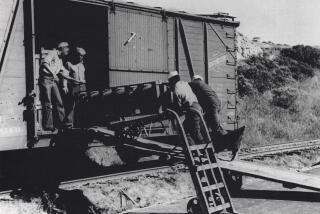Army Urged to Clear Civil Rights Pioneer : Military: Congressman urges exoneration of World War II pilot Bill Terry, who was court-martialed for entering a ‘whites only’ officers club in 1945.
- Share via
When Army bomber pilot Lt. Roger C. (Bill) Terry entered a “whites only” officers club with 60 other black aviators during World War II, he shouldered his way into civil rights history but effectively ended his military career.
Terry was one of the three black officers--later called the “Freeman Field Three”--who were court-martialed for their part in the 1945 incident, which set off a chain of events that eventually led to the desegregation of the military.
And because he brushed against a white officer as he forced his way into the club at the Seymour, Ind., base, he was the only one convicted. But now, nearly 50 years after the incident, a San Diego congressman is asking the Department of Defense to review the case and clear Terry’s name.
“This action would be a small but important step in acknowledging and helping to rectify the prejudice blacks experienced in our armed forces during that period,” said Republican Rep. Bill Lowery in a July 15 letter to Secretary of Defense Dick Cheney. Defense Department officials say they have not yet received the letter.
The request was also sent to Gen. Colin L. Powell, chairman of the Joint Chiefs of Staff and a longtime supporter of the Tuskegee Airmen Inc., a nonprofit national organization of the black pilots and their supporters. An aide to Powell said the general had not yet received the request and thus could not comment on it.
Terry, a retired Los Angeles County probation officer, is president of the Los Angeles chapter of Tuskegee Airmen. The group’s mission is to motivate and inspire young blacks and other Americans through speeches to schoolchildren, civic groups and university students.
Such audiences are often told about Terry and the Freeman Field affair. But Terry said this week that he is somewhat ambivalent about the effort to clear his name so many years later.
“If it’s done, I’d like it, sure. Who wouldn’t want to have their record cleared?” said Terry, 70. “But it’s late now. I would have liked to have had it done 45 years ago.”
Because of the conviction, Terry had to list the offense on job applications after he left the service. The disclosure, he said, hurt his employment prospects and career advancement. Lowery, in his written statement, said Terry was unfairly punished by the Army. Terry and the other black officers, Lowery said, were peacefully challenging illegal segregation at the Indiana air base.
“These dedicated individuals served our nation with distinction during World War II while bearing the additional burden of racial discrimination,” Lowery said. “The incident involving Lt. Terry occurred because he and other black officers resisted this discrimination.”
The matter was brought to Lowery’s attention by Charles Shockley, director of the San Diego Minority Business Development Center. Shockley became aware of Terry’s situation through a co-worker who was a member of the 99th Fighter Squadron, the first all-black Army Air Corps unit.
Shockley compares Terry to civil rights catalyst Rosa Parks. He said Terry and the other black airmen have been a source of inspiration for himself and others.
“He (Terry) can’t get back his career,” Shockley said. “But at least we can clear this up. I think the timing is right for the country to come to grips with this past injustice. We shouldn’t have to wait until a man dies.”
Terry lives in Inglewood with his wife, Mae.
Looking back on the events, Terry said he is proud of his actions.
“If I had to do it all over again, I would,” he said. “I feel, with all the other guys, we stood tall in this. We feel that this was the beginning of the desegregation of the armed forces.”
More to Read
Sign up for Essential California
The most important California stories and recommendations in your inbox every morning.
You may occasionally receive promotional content from the Los Angeles Times.













